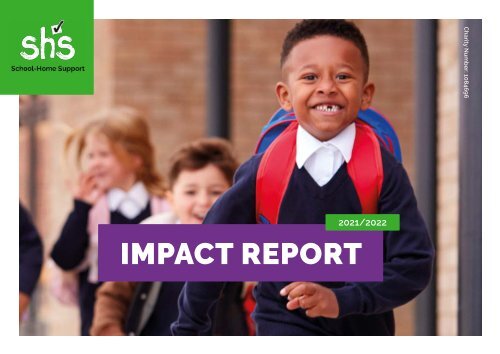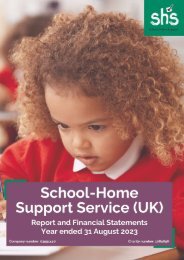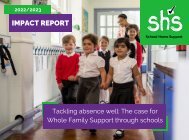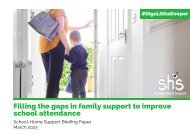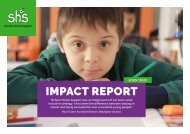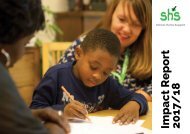School-Home Support Impact Report 21-22 (1)
Create successful ePaper yourself
Turn your PDF publications into a flip-book with our unique Google optimized e-Paper software.
Charity Number: 1084696<br />
20<strong>21</strong>/20<strong>22</strong><br />
IMPACT REPORT
CONTENTS<br />
3<br />
4<br />
6<br />
Introduction from<br />
Chief Executive 14<br />
7 Our impact Our theory<br />
of change 16<br />
What we are seeing<br />
on the ground 17<br />
18<br />
Meet our amazing<br />
practitioners<br />
Increase our reach<br />
in target areas<br />
Equality, diversity<br />
and inclusion<br />
Improving the system<br />
for our children<br />
and families<br />
8<br />
Family issues<br />
at referral<br />
20<br />
Our plan<br />
for 20<strong>22</strong>/23<br />
10<br />
Why we focus on<br />
school attendance<br />
<strong>21</strong><br />
Every child, in school,<br />
every day, by 2050<br />
12<br />
Our model<br />
and approach<br />
<strong>22</strong><br />
Thank you<br />
to our supporters<br />
The children referred to in the <strong>Impact</strong> <strong>Report</strong> have all had their names changed to protect<br />
their identity.
Introduction from the Chief Executive<br />
The long-term impact of COVID-19 and the cost of<br />
living crisis is disproportionately affecting those most<br />
vulnerable in society, and this includes the children<br />
and families we exist to support. The barriers to<br />
these children accessing their education are greater<br />
than ever and our effective and proven approach is<br />
never more needed, supporting families to recover<br />
from this situation stronger and more resilient.<br />
By the end of the autumn term 20<strong>21</strong> almost<br />
1.7 million children regularly missed school 1 with<br />
over 1,000 schools having an entire class-worth of<br />
severely absent children, meaning those children are<br />
out of school more than they are in 2 . Although these<br />
numbers were affected by the pandemic, almost<br />
900,000 (or one in eight) children each year 3 are<br />
missing too much school.<br />
The growing complexity of our case work as<br />
detailed in this report illustrates the impact of those<br />
day to day struggles. Families who were dealing with<br />
one major issue are now dealing with many more<br />
when their children are referred to us. The number<br />
of times our practitioners ‘interact’ with families<br />
has doubled compared to last year, with concerns<br />
relating to work and money increasing by 82%.<br />
As ever, we will continue to support children whose<br />
attendance takes longer to improve. Our support for<br />
these families whose children might be on the edge<br />
of the education system is crucial. For many, we are<br />
the positive constant in increasingly difficult lives<br />
and the progress they make.<br />
Tackling poor attendance and engagement<br />
at school isn’t a quick fix. To succeed, policy and<br />
practice must focus on the underlying causes of<br />
absence and ensure families have real and practical<br />
support when they need it. Failure to act could<br />
mean losing children from education for good.<br />
We are proud that our second Government<br />
funded Community Practitioner Service, this time<br />
in Liverpool, has made a strong start. Based on our<br />
successful Blackpool Service, it delivered on average<br />
9 more days of school per child in just<br />
two terms.<br />
We are extremely grateful to our advocates, like<br />
the Centre for Social Justice who have helped us<br />
keep school attendance and family support high on<br />
the political agenda. By recommending our model<br />
and approach in three high profile policy reports 4 and<br />
sharing our case studies, they have helped us take<br />
our cause to the highest levels of Government and<br />
the media.<br />
Our school engagement work is crucial to<br />
spreading and supporting best practice. Through<br />
<strong>School</strong>-<strong>Home</strong> <strong>Support</strong> membership, more schools<br />
have benefited from our experts in attendance,<br />
SEND, mental health and parental engagement.<br />
We now have 544 members.<br />
With the generous support of all our partners,<br />
funders and advocates we finish the year proud of<br />
our impact and ready to deliver on our bold and<br />
ambitious 5 year strategy and vision: ‘Every Child<br />
In <strong>School</strong> Every Day by 2050’. This impact report is<br />
testament to the tenacity and professionalism of<br />
our front line practitioners who work tirelessly with<br />
families to keep flourishing and safe. I hope it shows<br />
that when children and families are supported<br />
by someone they can trust, who has the time to<br />
understand what is going on at home, the impact<br />
on their education can be life-changing.<br />
1 Pupil absence in schools in England 20<strong>21</strong>/<strong>22</strong><br />
2 The Centre for Social Justice – May 20<strong>22</strong><br />
3 Department for Education – Pupil absence in schools in England – 2020/<strong>21</strong><br />
4 https://www.centreforsocialjustice.org.uk/library/repairing-our-society<br />
https://www.centreforsocialjustice.org.uk/library/lost-but-not-forgotten<br />
https://www.centreforsocialjustice.org.uk/library/kids-cant-catch-up-if-they-dont-show-up<br />
JAINE<br />
STANNARD<br />
Chief Executive<br />
<strong>School</strong>-<strong>Home</strong><br />
<strong>Support</strong><br />
SHS <strong>Impact</strong> <strong>Report</strong> 20<strong>21</strong>/20<strong>22</strong> 3
Our theory of change<br />
Our theory of change is what guides our work<br />
with children, their families and their schools.<br />
It brings together the way we work, how we<br />
measure our impact, and the reasons why<br />
we do it all in the first place. This keeps<br />
us accountable to ourselves and our funders,<br />
as our theory of change is a proven model<br />
for successful intervention. If the work<br />
we are doing follows this model, we know<br />
we are working effectively.<br />
SHS Theory of Change<br />
Too many children are growing<br />
up with low aspirations and<br />
limited opportunities which<br />
hold them back. <strong>School</strong>-<strong>Home</strong><br />
<strong>Support</strong>’s model and approach<br />
make a huge difference to<br />
the town inclusion strategy<br />
in Blackpool. They are trusted<br />
by families who know they<br />
have their best interests<br />
at heart.”<br />
What<br />
we do<br />
How<br />
we do it<br />
Our<br />
outcomes<br />
Work with children<br />
Promote engagement<br />
between school and parents<br />
Improved attendance and<br />
participation at school<br />
Work with schools<br />
Find practical solutions to<br />
education barriers<br />
Improved parental<br />
engagement in learning<br />
Work with parents<br />
Develop relationships and<br />
personal resources<br />
Improved character<br />
and resilience<br />
Paul Maynard<br />
MP, Blackpool North<br />
Long term<br />
outcomes<br />
Improved wellbeing for<br />
children from disadvantaged<br />
backgrounds<br />
Improved attainment of<br />
children from disadvantaged<br />
backgrounds<br />
Improved life chances for<br />
children from disadvantaged<br />
backgrounds<br />
4 SHS <strong>Impact</strong> <strong>Report</strong> 20<strong>21</strong>/20<strong>22</strong>
CASE STUDY<br />
AJAY’S STORY<br />
Ajay is 15 years old and lives with<br />
his mum and two younger siblings.<br />
When he was referred to <strong>School</strong>-<strong>Home</strong><br />
<strong>Support</strong> he was teetering on the edge<br />
of the education system, at risk of being<br />
exposed to harmful influences. His<br />
school attendance was just 39% and<br />
he was completely disengaged from his<br />
learning. Ajay was unable to see the<br />
benefits of going to school, and was<br />
at serious risk of missing out on his<br />
education entirely.<br />
<strong>School</strong>-<strong>Home</strong> <strong>Support</strong> practitioner<br />
Sharon began one to one sessions with<br />
Ajay, building a positive and trusting<br />
relationship that enabled Ajay to share<br />
his feelings and explain his frustrations.<br />
Working in collaboration with Ajay’s<br />
school, Sharon developed strategies<br />
to improve his school punctuality<br />
and attendance, alongside effective<br />
tools to support Ajay’s learning needs.<br />
In time, Ajay was able to explore<br />
his aspirations for the future, reengaging<br />
with his learning and building<br />
confidence in his abilities.<br />
Ajay’s school attendance has increased<br />
to 83.7% and his teachers report that<br />
he is now on track to be entered for his<br />
GCSEs as a year 10 student. Looking<br />
positively to his future and feeling<br />
confident in his own ability to succeed,<br />
the risk of Ajay engaging in dangerous<br />
behaviour is significantly reduced<br />
and he is happier both at home and<br />
at school.<br />
SHS <strong>Impact</strong> <strong>Report</strong> 20<strong>21</strong>/20<strong>22</strong> 5
What we are seeing on the ground<br />
Keeping children learning and safe<br />
As families emerged from the pandemic and<br />
schools reopened, the problems once hidden<br />
by successive lockdowns came to the surface.<br />
Our practitioners have witnessed an increase<br />
in the severity of need across their caseload.<br />
Typically, practitioners support multiple complex<br />
home issues at one time, but this year demand<br />
for support has been particularly intense. Our<br />
experienced practitioners know how easy<br />
it is for a family’s challenging situation to<br />
become a serious safeguarding risk, and how<br />
important it is that someone is looking out for<br />
the children in these families. This year’s figures<br />
show how vital whole-family support is to<br />
safeguarding children.<br />
30%<br />
increase in<br />
intensive<br />
case work<br />
56%<br />
increase in<br />
interactions on<br />
average per child<br />
82%<br />
increase in families<br />
presenting with<br />
money related<br />
problems compare<br />
to last year<br />
67%<br />
families dealing<br />
with at least<br />
two complex<br />
challenges<br />
at home<br />
174%<br />
increase in<br />
safeguarding alerts<br />
compared to<br />
pre COVID level<br />
6 SHS <strong>Impact</strong> <strong>Report</strong> 20<strong>21</strong>/20<strong>22</strong>
Our impact<br />
+7.8%<br />
=<br />
15 days<br />
more school<br />
63% of the children<br />
we supported improved<br />
their attendance.<br />
The average attendance<br />
increase over an average<br />
of 9 months was 7.8%<br />
which equates to<br />
an additional 15 days<br />
of school per year.<br />
+16%<br />
=<br />
32 days<br />
more school<br />
7 out of 10 of the persistently<br />
absence children<br />
we worked with improved<br />
their attendance by on average<br />
16% which is an extra<br />
32 days in school per child.<br />
Persistently absent children<br />
are those who are missing<br />
at least 10% of school which<br />
equates to nearly a month<br />
of school over the year.<br />
+9%<br />
organisations<br />
accessing free<br />
support<br />
We now have 544 members<br />
in total who access free<br />
information and support<br />
from our experts.<br />
+39%<br />
total family<br />
members<br />
supported<br />
This year our wider<br />
family reach was 18,162,<br />
up from 13,078.<br />
<strong>School</strong> <strong>Home</strong> <strong>Support</strong> has a laser focus on<br />
improving the lives of families in a practical<br />
way, its committed staff strengthening<br />
the links between home and school. Too many<br />
families who need this support aren’t getting it.<br />
We need to act quickly, to prevent children<br />
being lost from education for good.”<br />
Rt Hon Sir Stephen Timms MP for East Ham,<br />
Chair of the House of Commons Work<br />
and Pension Select Committee<br />
1<br />
New Target<br />
Area Reached<br />
347<br />
families supported<br />
by our Welfare Fund,<br />
twice as many<br />
as last year.<br />
A Community Practitioner<br />
Service has started to support<br />
schools and families in Liverpool.<br />
SHS <strong>Impact</strong> <strong>Report</strong> 20<strong>21</strong>/20<strong>22</strong> 7
Family issues at referral<br />
Progress<br />
to Work<br />
<strong>Home</strong> and<br />
Money<br />
GLOSSARY<br />
You might see a few unfamiliar phrases over the<br />
next few pages. If you come across something<br />
you don’t recognise, check the glossary below.<br />
WORD/<br />
PHRASE<br />
Intervention<br />
DEFINITION<br />
A period of<br />
support via<br />
intensive casework,<br />
groupwork, and<br />
‘Early Response<br />
<strong>Support</strong>’.<br />
PUT SIMPLY<br />
Our day-to-day<br />
work with<br />
children/their<br />
families.<br />
Feelings<br />
and<br />
Behaviour<br />
Confidence<br />
and Self<br />
esteem<br />
Friends<br />
Top 3<br />
presenting<br />
issues for<br />
Children<br />
Top 3<br />
presenting<br />
issues for<br />
Parents and<br />
Carers<br />
To Practitioner Gemma and the<br />
pastoral lead at school:<br />
Your Well<br />
Being<br />
I just wanted to say a massive<br />
thank you! This term has been<br />
so intense, challenging and<br />
heavy on safeguarding issues<br />
and you have both been outstanding.”<br />
Clare Cosgrove, Head of <strong>School</strong> at<br />
Knowleswood Primary <strong>School</strong><br />
Interaction<br />
Wider<br />
reach<br />
Early<br />
Response<br />
<strong>Support</strong><br />
Persistent<br />
absence<br />
Safeguarding<br />
The individual<br />
instances of<br />
contact during<br />
an ‘intervention’.<br />
Family or<br />
household<br />
members<br />
benefiting from<br />
our ‘intervention’<br />
with an individual.<br />
Individual<br />
support that isn’t<br />
‘intensive’, often<br />
involving signposting,<br />
guidance,<br />
and de-escalation.<br />
An attendance<br />
rate under 90% –<br />
the threshold for<br />
severe impacts<br />
on attainment and<br />
other outcomes.<br />
Protecting children<br />
from abuse<br />
and maltreatment;<br />
preventing harm<br />
to their health or<br />
development.<br />
Each conversation,<br />
meeting,<br />
and contact with<br />
an individual.<br />
How we help<br />
the people<br />
close to an<br />
individual.<br />
Helping children<br />
quickly<br />
by sharing<br />
resources and<br />
speaking<br />
one-on-one.<br />
Missing more<br />
than 1 out of<br />
every 10<br />
school days.<br />
Keeping<br />
children safe.<br />
8 SHS <strong>Impact</strong> <strong>Report</strong> 20<strong>21</strong>/20<strong>22</strong>
CASE STUDY<br />
ELLA’S STORY<br />
Ella is 10 years old and lives with<br />
her mum and dad. When she was<br />
referred to <strong>School</strong>-<strong>Home</strong> <strong>Support</strong> her<br />
attendance was 65% and she often<br />
arrived at school very distressed and<br />
upset. She was struggling to engage<br />
with her school work or her peers,<br />
which was exacerbating the anxiety<br />
she felt about going to school.<br />
Ella’s mum found her distress at<br />
school very worrying, and was often<br />
reluctant to bring her in. Working with<br />
her <strong>School</strong>-<strong>Home</strong> <strong>Support</strong> practitioner<br />
Clancey, Ella’s attendance steadily<br />
began to improve. Clancey met with<br />
Ella’s mum and her teacher to better<br />
understand her needs, and began<br />
weekly 1–1 sessions with Ella to<br />
build a trusting relationship that<br />
supported her to build her confidence<br />
and self-esteem at school. Small<br />
actions, like purchasing the family an<br />
alarm clock through our Welfare<br />
Fund made the morning routine easier<br />
and ensured Ella was getting to<br />
school on time. Clancey set up a<br />
friendship group with Pupils in Ella’s<br />
class, providing lots of opportunities<br />
for Ella to play and interact with her<br />
peers, reducing her feelings of isolation<br />
at school and meaning Ella began to<br />
look forward to being there.<br />
With Clancey’s support, Ella’s<br />
attendance has improved to 85%,<br />
and she is arriving at school happier<br />
and calmer. As Ella’s mum trusts<br />
Clancey to care for Ella at school,<br />
she feels confident encouraging her to<br />
go to school. Spending more time<br />
at school, Ella is building confidence,<br />
progressing in her school work and<br />
playing happily among her peers.<br />
SHS <strong>Impact</strong> <strong>Report</strong> 20<strong>21</strong>/20<strong>22</strong> 9
Why we focus on school attendance<br />
By the end of the autumn term 20<strong>21</strong> almost<br />
1.7 million children regularly missed<br />
school with over 1,000 schools having an entire<br />
class-worth of severely absent children.<br />
Better school outcomes<br />
As a charity we exist to close the gap between<br />
disadvantaged children and their better off<br />
peers. We work to improve their wellbeing,<br />
attainment and life chances by ensuring they<br />
are in school and ready to learn for as much<br />
time as possible. The evidence is clear: there<br />
is a strong link between good attendance<br />
at school and strong attainment outcomes<br />
for children. In other words school is<br />
the best place for most children to learn, thrive<br />
and be safe.<br />
Stronger safer communities where<br />
children can thrive<br />
In addition to improving outcomes for children,<br />
addressing persistent absence through family<br />
support offers a chance to build stronger, safer<br />
communities, helping to prevent negative<br />
outcomes for children.<br />
Understanding the value of intervention<br />
Providing holistic family support to tackle<br />
absence isn’t a cost, it is an investment. It costs<br />
<strong>School</strong>-<strong>Home</strong> <strong>Support</strong> approximately £1,000<br />
to fund one tailored plan, per child per year.<br />
Compare £1,000 to the £1,965 1 annual cost per<br />
individual missing at least 5 weeks of school<br />
(those below the Persistent Absence threshold).<br />
One year’s investment with <strong>School</strong>-<strong>Home</strong><br />
<strong>Support</strong> would deliver a valuable injection of<br />
resources to provide best practice and work with<br />
schools to improve school attendance. At the<br />
same time, this investment achieves savings at<br />
both local and national level.<br />
1 Government funded cost benefit analysis research for Greater Manchester Combined Authority<br />
http://www.greatermanchester-ca.gov.uk/what-we-do/research/research-cost-benefit-analysis/<br />
10 SHS <strong>Impact</strong> <strong>Report</strong> 20<strong>21</strong>/20<strong>22</strong>
CASE STUDY<br />
JACOB’S STORY<br />
Jacob is 12 years old and lives with<br />
his mum, his two older brothers and<br />
his younger sister. Orginally from<br />
Czechia, his family have moved around<br />
a lot, and the recent move to the area<br />
was due to Jacob’s mum experiencing<br />
physical abuse from his father. This was<br />
having a significant impact on Jacob’s<br />
education, as he was at his fourth new<br />
school since 2019.<br />
Jacob’s family were living in extremely<br />
difficult and cramped conditions, with<br />
Jacob and his younger sister sleeping<br />
on two sofas pushed together in the<br />
living room. Their situation at home<br />
was putting great strain on the family’s<br />
emotional and physical wellbeing.<br />
Jacob was relied upon to support his<br />
mum with her physical and mental<br />
health needs, as well as translating<br />
for her. When he was able to get<br />
to school, he was emotionally and<br />
physically drained and struggled to<br />
engage in his lessons. <strong>School</strong>-<strong>Home</strong><br />
<strong>Support</strong> practitioner Danielle worked<br />
closely with the family to tackle their<br />
difficult living conditions, utilising our<br />
Welfare Fund to buy new foldaway<br />
beds to ensure the family all had their<br />
own bed to sleep in, and supported<br />
them with the process of applying for<br />
better housing.<br />
At school, Danielle worked with school<br />
staff to allocate free breakfast club<br />
places for Jacob and his younger sister,<br />
meaning she was able to have a daily<br />
morning check-in with them both to<br />
monitor their attendance and wellbeing.<br />
She supported Jacob to join the school<br />
football team, which he greatly enjoyed<br />
and allowed him to find his place<br />
among his peers.<br />
By tackling the family’s housing issues,<br />
and supporting Jacob at school, his<br />
attendance, engagement and wellbeing<br />
started to improve. In just one month of<br />
support, Jacob’s attendance increased<br />
from 69.1% to 74.5%, an extra two full<br />
days in school. Happier at school and at<br />
home, Jacob and his family are building<br />
resilience for the future.<br />
SHS <strong>Impact</strong> <strong>Report</strong> 20<strong>21</strong>/20<strong>22</strong> 11
Our model and approach<br />
The support provided by the SHS practitioner, to<br />
both the school and families has been invaluable.<br />
SHS has become an intrinsic part of the support<br />
which schools provide to families.”<br />
Paddy Gallagher, Deputy Vice Principal at<br />
BUILD<br />
A BRIDGE<br />
between home and<br />
school supporting children<br />
and families to increas<br />
their own resilience and<br />
independence so the<br />
impact we make<br />
is sustainable<br />
REFERRAL<br />
due to low attendance<br />
record, teacher<br />
suggestion, self-referral<br />
by the families, etc.<br />
WORK IN<br />
PARTNERSHIP<br />
with a range of<br />
community services<br />
and agencies to<br />
ensure families get<br />
the specialist<br />
support they need<br />
NEEDS<br />
ASSESSED<br />
when the pupil and/or<br />
family meets with<br />
practitioner, possibly<br />
during a home visit<br />
where the family<br />
feels most<br />
confortable<br />
PERSONALISED<br />
PLAN CREATED<br />
in collaboration with<br />
family, SHS practitioners<br />
are trained to work within<br />
boundaries and<br />
casework supervision<br />
reinforce this<br />
One in A Million Free <strong>School</strong><br />
Claire is so funny, I love it when she comes into<br />
school for our time. She always makes you feel<br />
happy even when you’re in a bad mood and<br />
always listens to you. You can talk to her even<br />
when you’ve done something wrong and she’ll<br />
help you make it right again.”<br />
Dillon – Student from a school in Blackpool<br />
Our Practitioner Service approach has been<br />
recommended by the Centre for Social Justice<br />
as a solution to directly improving school<br />
attendance. Partnering with schools, local<br />
authorities, local agencies and families, our<br />
practitioners work with the whole-family<br />
to improve attendance, engagement and<br />
wellbeing. By addressing the root causes<br />
of school absence, our work provides<br />
sustained improvement to children and<br />
children, their families and schools.<br />
12 SHS <strong>Impact</strong> <strong>Report</strong> 20<strong>21</strong>/20<strong>22</strong>
She (our SHS practitioner) was<br />
great at listening to what I needed<br />
to say, her feedback was brilliant.<br />
She was supportive without sugar<br />
coating things.”<br />
Parent, End of <strong>Support</strong> Survey 20<strong>22</strong>
Meet some of our amazing practitioners<br />
We recruit from a wide range of professional<br />
backgrounds, and train our staff to provide a full<br />
range of services. Experts in family engagement,<br />
our practitioners aim to build a bridge between<br />
home and school. Using and sharing best<br />
practice, our techniques include initiating and<br />
developing positive relationships which allow<br />
for both challenge and support.<br />
CLANCEY<br />
JEFFERSON<br />
LAUREL<br />
WHY I WORK AT SHS. For me it’s all about<br />
creating independent pathways to success for<br />
Students and families. I love helping with barriers<br />
and watching them do the rest themselves.<br />
PROUDEST MOMENT. This year it was probably<br />
exam results day when one of my Students<br />
got the grades he needed for his T level course<br />
at college.<br />
WHAT SCHOOL SAID. Jeff’s commitment to the<br />
Students and families at St Catherines is<br />
unwavering. Jeff works exceptionally well with<br />
Students, parents and staff often being that vital link.<br />
WHY I WORK AT SHS. When I worked with a Local<br />
Authority, fining families rarely changed things<br />
for the better. <strong>Support</strong>ing families with attendance<br />
is rewarding and it works.<br />
PROUDEST MOMENT. I have lots, but seeing<br />
families communicate with school without my<br />
help- that makes me really proud.<br />
WHAT SCHOOL SAID. Our families appreciate<br />
being able to discuss the challenges they face.<br />
There’s no doubt that they benefit from having<br />
Laurel, particularly as they navigate the cost of<br />
living crisis and after effects of the pandemic.<br />
WHY I WORK AT SHS. Being a <strong>School</strong>-<strong>Home</strong><br />
<strong>Support</strong> practitioner is an amazing job! Having<br />
a strong bridge between home and school for<br />
those children who need a little extra support,<br />
reassurance and understanding is so important<br />
to happy flourishing children.<br />
PROUDEST MOMENT. Probably when I see the<br />
parents I support take their own first steps back<br />
to success – volunteering in the community,<br />
applying for jobs, researching college courses to<br />
get qualifications they may have missed. Because<br />
when a child has a parent with aspirations, they<br />
have the best role-model of all.<br />
WHAT SCHOOL SAID. Our practitioner, Clancey,<br />
is a valuable member of our team, contributing in<br />
numerous areas of school life. She is there to go<br />
above and beyond for the children who need it<br />
most and has had a positive impact on both the<br />
attendance and wellbeing of some of our hardestto-reach<br />
families.<br />
14 SHS <strong>Impact</strong> <strong>Report</strong> 20<strong>21</strong>/20<strong>22</strong>
CASE STUDY<br />
JAYDEN’S STORY<br />
Jayden is 7 years old and lives with his<br />
mum and two younger siblings. His<br />
mum is a survivor of domestic violence<br />
and has no family support network.<br />
The family were facing significant<br />
financial worries and mum was<br />
incredibly worried about the increasing<br />
cost of living. Pressures at home were<br />
affecting Jayden’s learning and he was<br />
falling behind at school. After the family<br />
was referred to <strong>School</strong>-<strong>Home</strong> <strong>Support</strong>,<br />
our practitioner Ayesha supported<br />
Jayden’s mum with alleviating some<br />
of her financial worries, setting up a<br />
payment plan to manage her existing<br />
debts and supporting her to prepare<br />
for the increasing energy prices.<br />
As Jayden’s younger brother had<br />
recently been diagnosed with Autism,<br />
Ayesha guided mum on applying for<br />
the Disability Living Allowance she<br />
is entitled to. Ayesha applied to our<br />
Welfare Fund to buy a new school<br />
uniform for Jayden, and a desk so that<br />
he would have some space at home<br />
to complete his homework away from<br />
his younger siblings. Since getting his<br />
new desk, Jayden is submitting his<br />
homework frequently and has even<br />
won an award from his headteacher.<br />
As Jayden is engaging more with<br />
school, he is enjoying his learning and<br />
looks forward to going to school.<br />
Thank you so much<br />
for the desk, he loves<br />
it. It has changed his<br />
whole mood and the<br />
way he does work.”<br />
Jayden’s mum<br />
SHS <strong>Impact</strong> <strong>Report</strong> 20<strong>21</strong>/20<strong>22</strong> 15
Increasing our reach in target areas<br />
We have scaled up and consolidated our<br />
work in London, Blackpool, Bradford,<br />
Greater Manchester, Eastbourne, Kent<br />
and Medway,<br />
Liverpool and Sefton<br />
Our new Community Practitioner Service,<br />
funded by the Department for Education (DfE)<br />
is making a difference to local families who<br />
need support so their children can access<br />
their education. Liverpool and Sefton have<br />
some of the highest levels of persistent school<br />
absence in the country, but with bespoke<br />
support for the whole-family to remove barriers<br />
to learning we are having a strong impact<br />
in a short space of time, increasing average<br />
attendance per student by 9 days in two terms.<br />
“We recently had a visit from DfE<br />
representatives and were able to tell them all<br />
about the project and how pleased we were with<br />
it thus far” Clare Graham, Deputy Headteacher,<br />
Northcote Primary <strong>School</strong>, Liverpool.<br />
Bradford<br />
Work on the Holme Wood estate since 2018 has<br />
deepened our knowledge and relationships with<br />
local partners. In 20<strong>21</strong>/<strong>22</strong>, we saw 36 (34%) Pupils<br />
move above the persistently absent threshold.<br />
This is a high number of children moving from<br />
persistently absent to regularly attending, a huge<br />
achievement for all concerned. We’re hoping<br />
to expand our service in Bradford,<br />
Blackpool<br />
We are extremely proud of our work in<br />
Blackpool and the contribution we’re making<br />
to the town wide inclusion strategy. Secretary<br />
of State for Education Nadhim Zahawi met<br />
Blackpool families and practitioners to learn<br />
more about our model and the impact it has<br />
on pupil attendance and family resilience.<br />
Our work in the town has received strong third<br />
party accolades including Paul Maynard MP<br />
and York Consulting LLP, one of the UK’s<br />
leading socio-economic research and evaluation<br />
consultancies, who consider it replicable in<br />
other areas of England.<br />
The team from SHS have been able to reach<br />
beyond the existing relationships we have<br />
with target families … Being a separate<br />
entity to the school’s staffing structure, has<br />
been a core element of this, with families<br />
more willing to be honest and open, trusting<br />
the SHS workers to then be advocates in<br />
navigating meetings and other situations”<br />
Ruth Braithwaite, Headteacher<br />
at Bedford Primary <strong>School</strong><br />
‹ Our team<br />
briefing<br />
Secretary<br />
of State for<br />
Education<br />
Nadhim Zahawi<br />
16 SHS <strong>Impact</strong> <strong>Report</strong> 20<strong>21</strong>/20<strong>22</strong>
Equality, diversity and inclusion<br />
Equality, diversity and inclusion (EDI) are central<br />
to our vision that ‘every child has the support<br />
they need to thrive and achieve’. <strong>School</strong>-<strong>Home</strong><br />
<strong>Support</strong>’s commitment to creating a diverse<br />
workforce that is representative of the children,<br />
families and communities, isn’t just a moral<br />
imperative, it’s also an operational necessity.<br />
Understanding diversity of service<br />
users and staff<br />
Delivering against our three-year strategy<br />
(2019-<strong>22</strong>) we continue to focus on<br />
understanding the diversity of our service<br />
users and staff through the development<br />
of robust data collection and analytics.<br />
Our data shows that the proportion of<br />
improvement in attendance our service<br />
delivers reflects the ethnicity and gender<br />
breakdown of the children and young<br />
people we work with.<br />
New equaity monitoring<br />
The new Equality Monitoring Form is helping to<br />
steer our EDI recruitment strategy. In 20<strong>21</strong>/<strong>22</strong><br />
the ethnicity of our front line staff proportionally<br />
reflected the ethnic background of the children<br />
and children we support.<br />
Translation<br />
As part of our work to identify key barriers to<br />
engagement for our families with the generous<br />
help of our corporate partners, we’ve embarked<br />
on an ambitious translation programme. We now<br />
have key leaflets about our service available<br />
in 11 languages for families.<br />
As part of our goal to foster a positive working<br />
environment that recognises and values<br />
differences, we have provided a multitude<br />
of EDI training opportunities in the last<br />
academic year with big plans for this year.<br />
Diversifying our Board of trustees<br />
The growing diversity of our board of trustees,<br />
has been helped by our investment in the<br />
Transform Programme which led to the<br />
recruitment of high quality trustees – a<br />
dedicated advocate for diversity and inclusion<br />
who is also an expert in conduct and ethics<br />
culture as well as our first ever young trustee.<br />
Equality, Diversity and Inclusion at <strong>School</strong>-<br />
<strong>Home</strong> <strong>Support</strong>, we are committed to creating<br />
a diverse workforce that is representative of<br />
the communities we support, and an inclusive<br />
culture where all our staff and service users<br />
can thrive.<br />
This is a great first step in diversifying<br />
our board of trustees, a commitment<br />
we have made to be more inclusive<br />
and representative of our service users<br />
and the communities we support.<br />
Having a Trustee with lived experience<br />
bring their insights and passion to<br />
change lives feeding into our board of<br />
trustees will add a new and extremely<br />
powerful perspective and voice.”<br />
Fred Sharrock, Chair of trustees<br />
SHS <strong>Impact</strong> <strong>Report</strong> 20<strong>21</strong>/20<strong>22</strong> 17
Improving the system for our children and families<br />
Our impact continues to stretch beyond the<br />
classroom, with our advocacy work and insights<br />
from the front line reaching the highest levels<br />
of Government, national media and the third<br />
sector. We are speaking up for our children and<br />
families who need education policy and practice<br />
to work for them.<br />
We continue to build a network of allies<br />
across both Government and Parliament<br />
and other thought leaders who are ready to<br />
advocate on behalf of our families.<br />
• The Secretary of State for Education<br />
came to Blackpool to talk to our families<br />
and practitioners about family support<br />
for attendance.<br />
• ● Number 10 Policy Unit invited us to brief<br />
them on the changes to underlying causes<br />
of absence.<br />
• ● The DfE continues to fund us to work<br />
with families where need is greatest, most<br />
recently in Liverpool.<br />
• ● The Government’s <strong>School</strong>’s Bill has<br />
attendance at its core with strong references<br />
to underlying causes and family support.<br />
• ● We’ve contributed to policy reports by the<br />
Social Mobility Commission, Children’s<br />
Alliance, the Centre for Social Justice, and took<br />
part in our first policy leaders podcast.<br />
• ● Our footprint in Parliament is growing and<br />
Key Select Committees have shown interest<br />
in our work.<br />
• ● We are regularly approached for input by high<br />
quality national media including the BBC and<br />
the Financial Times. Taking part in our first<br />
podcast for Centre for Social Justice we have<br />
a growing reputation for an organisation with<br />
a trusted, knowledgeable and authoritative<br />
voice on attendance and education<br />
inequalities.<br />
Best Year<br />
Yet for<br />
influencing<br />
A busy year speaking to<br />
decision makers is reflected in<br />
growing interest in our model<br />
and approach. In its Education<br />
White Paper, the Government<br />
acknowledges two critical things:<br />
the importance of families in<br />
closing the disadvantage gap<br />
and that poor attendance is often<br />
driven by problems at home.<br />
Best Year<br />
Yet for<br />
sharing our<br />
stories<br />
Getting our families’ stories<br />
into the media and key reports<br />
is critical to fundraising and<br />
influencing. We surpassed our<br />
target by 50%.<br />
18 SHS <strong>Impact</strong> <strong>Report</strong> 20<strong>21</strong>/20<strong>22</strong>
CASE STUDY<br />
DANIEL’S STORY<br />
Daniel is 5 years old and was referred to<br />
<strong>School</strong>-<strong>Home</strong> <strong>Support</strong> as he was increasingly<br />
showing signs of anxiety towards going<br />
to school and would often become very<br />
emotional when arriving. Along with Daniel’s<br />
emotional needs, the family faces challenges<br />
with his mum’s poor physical health. She<br />
has recently recovered from cancer, and<br />
the lasting side effects of treatment meant<br />
that she had to leave her job. As a result,<br />
the family could no longer afford the<br />
weekly £12.50 costs of Daniel’s breakfast<br />
club, which was an essential part of his<br />
morning routine. Without it, his regular<br />
routines became fractured and exacerbated<br />
his worries about going to school. Our<br />
practitioner secured the family the financial<br />
support they needed for breakfast club,<br />
and Daniel’s routine has been restored.<br />
When referred to <strong>School</strong>-<strong>Home</strong> <strong>Support</strong>,<br />
Daniel’s attendance was at 89.6% and with<br />
support, any further drop in attendance was<br />
prevented and has now increased to 93.4%.<br />
SHS <strong>Impact</strong> <strong>Report</strong> 20<strong>21</strong>/20<strong>22</strong> 19
Our plan for 20<strong>22</strong>/23<br />
Reach more children and families<br />
We will continue to work in our established<br />
target geographical areas of Blackpool,<br />
Bradford, Liverpool, London and Manchester.<br />
We are committed to these areas and are<br />
successful in the schools where our practitioners<br />
operate. We aim to embed our work in the<br />
new area of Liverpool and will scope a further<br />
area to deliver services in 2023–24. We will<br />
also seek opportunities to increase our delivery.<br />
<strong>Support</strong> more schools to address<br />
persistent absence<br />
We will research new ways to deliver our<br />
services. A new <strong>School</strong>s Bill is working<br />
its way through Parliament which will create<br />
national school attendance standards. How<br />
schools approach these standards is crucial<br />
to the long-term success of the Government<br />
initiatives and to relationships with hard<br />
to reach families. We know our whole-family<br />
support model works so we will therefore<br />
consult with key stakeholders this year<br />
to allow us to identify strategies to embed<br />
best practice nationally.<br />
Influence policy and practice<br />
We will launch our first national campaign in<br />
20<strong>22</strong>–23. <strong>Support</strong> Before Court will promote<br />
whole-family support before sanctioning<br />
parents/carers for non-attendance. We support<br />
the Government’s drive on improving attendance<br />
in schools but without sufficient resources and<br />
funding, schools could be forced into reaching<br />
for more punitive measures that affect their<br />
relationships with families, resulting in fines and<br />
court visits that ultimately affect a child’s ability<br />
to access their education.<br />
20 SHS <strong>Impact</strong> <strong>Report</strong> 20<strong>21</strong>/20<strong>22</strong>
Every child, in school, every day by 2050<br />
The need for our service continues to increase<br />
year on year. Fundamental shifts in the<br />
education and social care landscape driven<br />
by the <strong>School</strong>s Bill, the SEND green paper and<br />
children’s social care are responding to gaps<br />
in support services which have been growing<br />
for too long. We must be ambitious and bold<br />
if we are to widen our reach and impact.<br />
We have therefore undertaken consultation<br />
with key stakeholders to help develop a<br />
new 5 year strategy that will have at its<br />
heart the vision that Every child is in school,<br />
every day, by 2050.<br />
Our strategic aims<br />
GOAL<br />
1<br />
Children and families<br />
have access to<br />
the support they need<br />
for children to be<br />
in school, ready to learn.<br />
GOAL<br />
2<br />
<strong>School</strong>s are confident<br />
and effective in<br />
addressing persistent<br />
absence through access<br />
to best practice<br />
information and support.<br />
GOAL<br />
3<br />
Education policy<br />
and systems support<br />
and enable all children<br />
to be in schools.<br />
SHS <strong>Impact</strong> <strong>Report</strong> 20<strong>21</strong>/20<strong>22</strong> <strong>21</strong>
Thanks to our supporters<br />
The A D Charitable Trust<br />
Allen & Overy<br />
BBC Radio 4 Appeal narrated<br />
beautifully by our Patron Lady<br />
Sophie Windsor.<br />
The Bloomfield Trust<br />
BlackRock<br />
Brabners Foundation<br />
Breadsticks Foundation<br />
Bruno Schroder Trust<br />
CIBC<br />
City Bridge Trust<br />
Clifford Chance<br />
The Colyer-Fergusson Charitable<br />
Trust<br />
The Crispin Davis Family Trust<br />
Discover Financial Services<br />
Esmée Fairbairn Foundation<br />
L&Q Foundation<br />
The Liz & Terry Bramall Foundation<br />
London Stock Exchange Group<br />
Loomis Sayles Investments Ltd<br />
The Mahoro Charitable Trust<br />
MariaMarina Foundation<br />
The Montier Charitable Trust<br />
Pears Foundation<br />
PFG<br />
Porticus<br />
Reed Smith<br />
Reedham Children’s Trust<br />
The Schroder Foundation<br />
The Swire Charitable Trust<br />
Sylvia Adams Charitable Trust<br />
United St Saviour’s Charity<br />
The Vintners’ Foundation<br />
St James’s Place Charitable<br />
Foundation<br />
Stewarts Foundation<br />
Terra Firma<br />
The Cinven Foundation<br />
The Liberum Foundation<br />
Weil, Gotshal and Manges<br />
(London) LLP<br />
The Worshipful Company<br />
of International Bankers<br />
Veronica and Lars Bane<br />
The Big Give<br />
The Childhood Trust<br />
<strong>22</strong> SHS <strong>Impact</strong> <strong>Report</strong> 20<strong>21</strong>/20<strong>22</strong>
This has been superb for our families,<br />
it’s just what we need.”<br />
Tracy Webley, Headteacher<br />
Springwell Park Primary <strong>School</strong>, Sefton
24 SHS <strong>Impact</strong> <strong>Report</strong> 20<strong>21</strong>/20<strong>22</strong><br />
schoolhomesupport.org.uk


